The Bay of Plenty woman putting a fizz into kefir
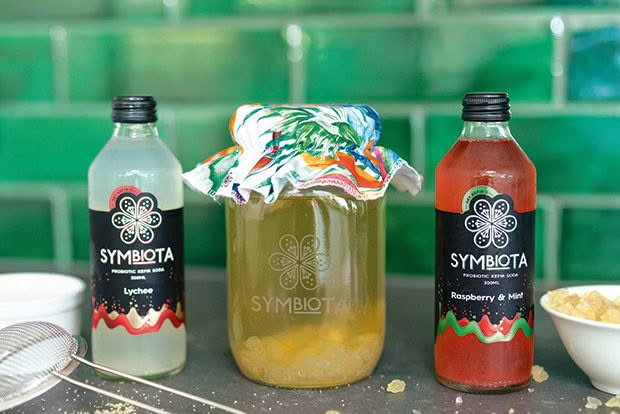
The link between gut and mental health is a recent advance in medical knowledge. It sent a psychology student into a ferment.
Words: Kate Coughlan Photos: Justin Aitken
Pāpāmoa-based Amber Fairweather grew up in rural Kwa-Zulu Natal, the garden province of South Africa, on a farm a two-hour drive from anywhere.
“We didn’t have electricity or telephone and raised or grew almost all our food. Our mother made cheese, we cooked on an anthracite stove, used a coal-filled iron, heated water in a donkey boiler — a drum of water with a fire beneath — and contacted the outside world by radio. It was living off the land.”
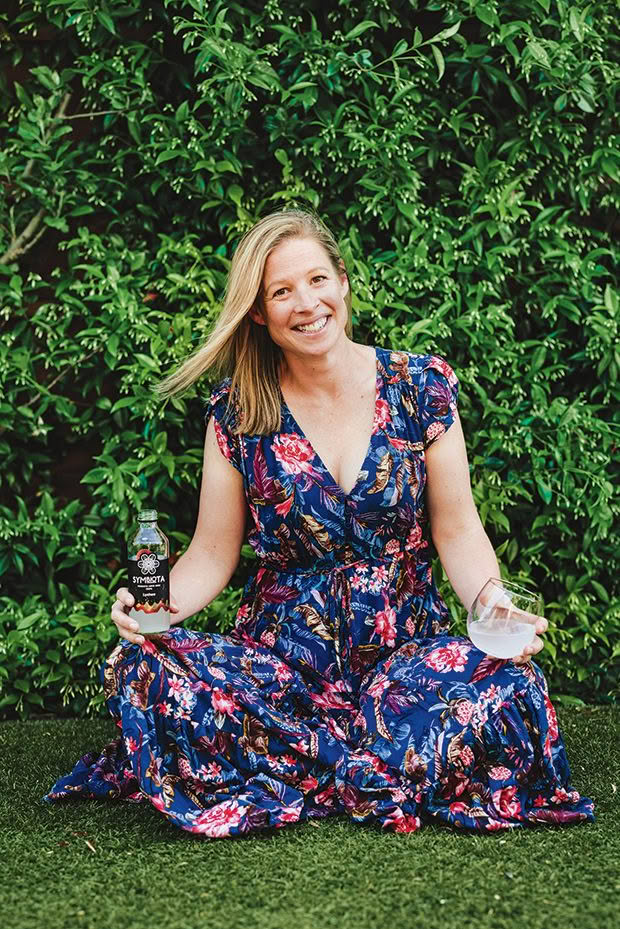
Amber’s parents experienced the challenge of five farmland claims in Angola and South Africa, were caught up in bush wars in then-Rhodesia and faced an outbreak of bovine tuberculosis that affected their cattle ranch before selling a final property, producing rosemary and rose geranium oil, and emigrating to New Zealand. They arrived on Christmas Day 2009. Amber, a university student at the time, resumed psychology studies at Massey University.
“Working toward my master’s in psych, I became most interested in the relationship between gut health, autoimmune disorders and mental health.
“When I started looking at how gut health is improved, I realised with interest that I was studying my childhood diet. That was our way of life, to eat natural and fermented foods, and it all made sense to me.”
However, her aesthetic eye was not so at home with what she found available in DIY fermenting kits, especially the pots for sale.
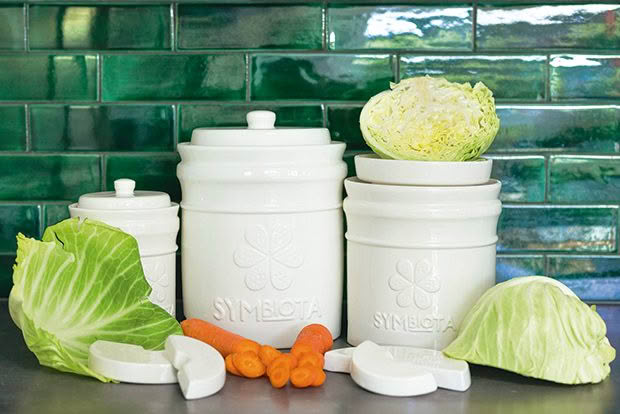
“I realised I’d have to design my own to combat all the deficits of the others on the market. They also needed to look good. I wanted one that was beautiful, functional and easy to use so anyone could become confident quickly with fermentation.”
She spent some time on a pleasing pot design. Then, she had some made, launching an e-commerce site, Symbiota, in 2019. That set her on a course that has now become a business, selling a variety of products online as well as stocking North Island supermarket shelves with a fermented water kefir drink, and smaller retailers nationwide.
“It feels like I have been grinding away for a very long time, but the business is now where I want it to be in terms of growth,” says Amber, who still works outside the business several days each week.
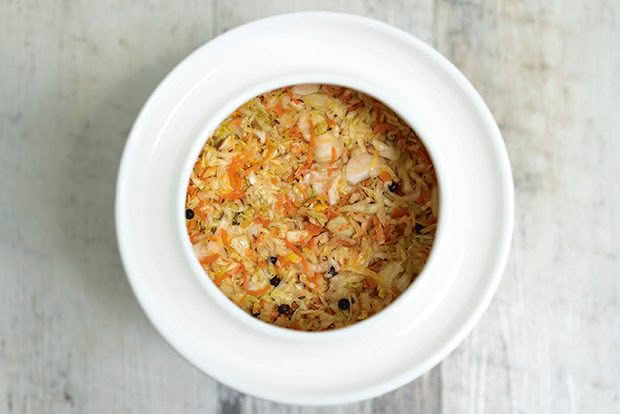
“Symbiota has grown organically with no outside investment — through a lot of help and support from my husband and friends — but I might need to take the next step soon to start looking at investors. I can’t continue to grow it without some capital.”
Supermarket distribution, while offering excellent growth potential, requires upfront investment due to the delayed payment terms. Amber grows her fermentation grains in a facility near her home in Papamoa, a beachside suburb of Tauranga, and uses the bottling line of a manufacturer nearby.
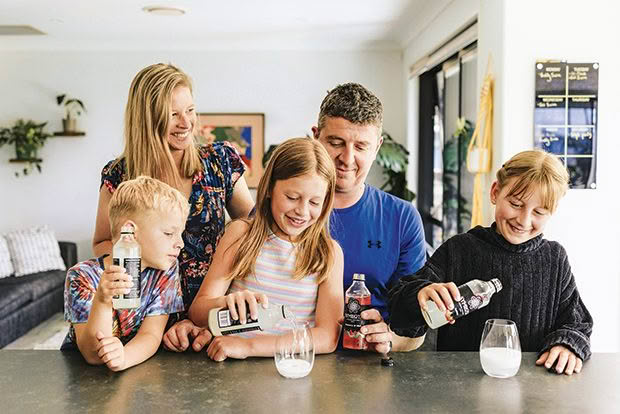
Amber and Warren Fairweather with their children (from left) Samuel, Elizabeth and Lylah; (below left).
Plans for further expansion include commercial production of sauerkraut, fermented hot sauces and fermented relishes.
“It is hard to ignore the demand, especially for the sauerkraut.”
The challenges, Amber says, include scaling the business without capital and producing enough culture to meet the growing market demand for functional drinks.
“There is a big uptake among people seeking an alternative to alcohol. They want a complexity of flavour to please the palate and be enjoyed in a social setting. Drinks that are low in sugar and provide a probiotic boost are increasingly sought after.”
WHAT IS KEFIR WATER?
It is similar to kombucha but fermented with a different culture. Unlike a kombucha scoby, water kefir cultures resemble jelly grains. They sit at the bottom of the fermentation jar and convert sugar water to probiotic water kefir, as opposed to kombucha, which utilises tea and sugar in the fermentation process.
The gluten-free culture grains are generally passed from generation to generation. However, Amber has mastered the tricky business of upscaling to produce commercial quantities of grains within Ministry of Primary Industries regulations.
The result is a slightly more gentle and not as tangy taste compared with kombucha. It is caffeine-free and generally has very low (0.22 per cent) alcohol, lower than orange juice.
Two Symbiota flavours are available: Raspberry & Mint and Lychee. Amber is hoping to add a third flavour shortly.
She suggests drinking water kefir chilled or over ice as a healthy summer alcohol-free cocktail, or mixing kefir sodas with gin, vodka or tequila. Kefir also blends well into white spirit cocktails. symbiota.co.nz
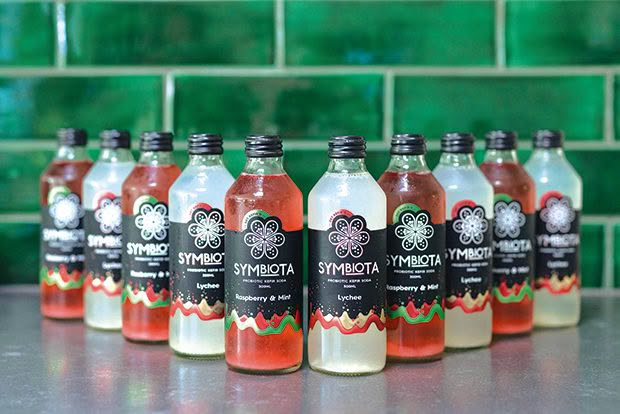
WHAT ARE PROBIOTICS, AND WHY IS IT GOOD TO DRINK THEM?
Probiotics are live microorganisms considered to have health benefits. Overly processed foods can lose their active components, so consuming foods with probiotics is thought to aid the development of a wide array of gut flora and confer benefits for immune and
brain disorders.
Love this story? Subscribe now!
 This article first appeared in NZ Life & Leisure Magazine.
This article first appeared in NZ Life & Leisure Magazine.
